英语语法总结表格
- 格式:pdf
- 大小:189.01 KB
- 文档页数:3
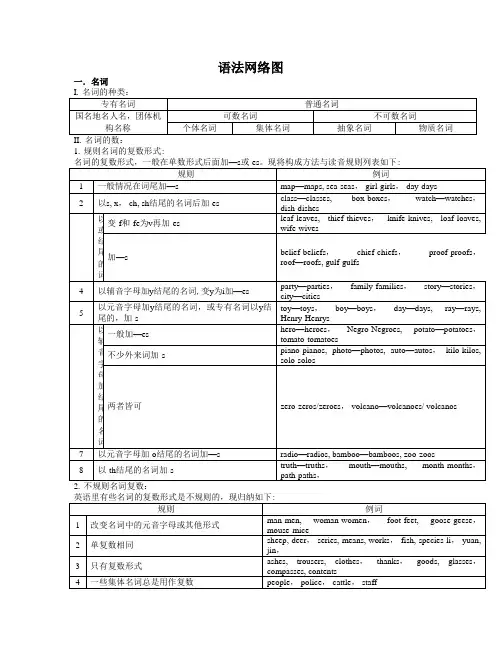
语法网络图一.名词1. 规则名词的复数形式:名词在句中表示所有关系的语法形式叫做名词所有格.所有格分两种:一是名词词尾加’s构成,二是由介词of加名词构成。
前者多表示有生命的东西,后者多表示无生命的东西。
用于无生命的东西:the legs of the chair, the cover of the book用于有生命的东西,尤其是有较长定语时:the classrooms of the first—year students用于名词化的词:the struggle of the oppressed二.冠词冠词分为不定冠词(a, an),定冠词(the),和零冠词。
1. one, some与any:1) one可以泛指任何人,也可特指,复数为ones。
some多用于肯定句,any多用于疑问句和否定句。
One should learn to think of others.Have you any bookmarks? No, I don’t have any bookmarks。
I have some questions to ask.2) some可用于疑问句中,表示盼望得到肯定的答复,或者表示建议,请求等。
Would you like some bananas? Could you give me some money?3) some 和any修饰可数名词单数时,some表示某个,any表示任何一个。
I have read this article in some magazine。
Please correct the mistakes, if any。
4) some和数词连用表示“大约”,any可与比较级连用表示程度。
There are some 3,000 students in this school. Do you feel any better today?2。
each和every:each强调个别,代表的数可以是两个或两个以上,而every强调整体,所指的数必须是三个或三个以上。
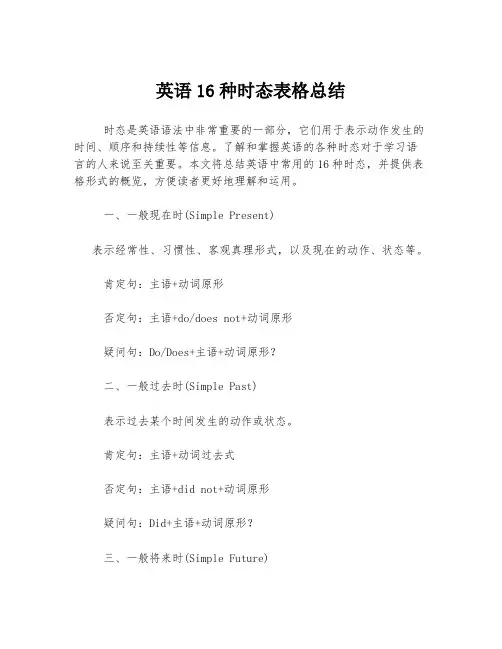
英语16种时态表格总结时态是英语语法中非常重要的一部分,它们用于表示动作发生的时间、顺序和持续性等信息。
了解和掌握英语的各种时态对于学习语言的人来说至关重要。
本文将总结英语中常用的16种时态,并提供表格形式的概览,方便读者更好地理解和运用。
一、一般现在时(Simple Present)表示经常性、习惯性、客观真理形式,以及现在的动作、状态等。
肯定句:主语+动词原形否定句:主语+do/does not+动词原形疑问句:Do/Does+主语+动词原形?二、一般过去时(Simple Past)表示过去某个时间发生的动作或状态。
肯定句:主语+动词过去式否定句:主语+did not+动词原形疑问句:Did+主语+动词原形?三、一般将来时(Simple Future)表示将要发生的动作或状态。
肯定句:主语+will+动词原形否定句:主语+will not+动词原形疑问句:Will+主语+动词原形?四、现在进行时(Present Continuous)表示现在正在进行的动作或状态。
肯定句:主语+am/is/are+动词现在分进行否定句:主语+am/is/are not+动词现在分进行疑问句:Am/Is/Are+主语+动词现在分进行?五、过去进行时(Past Continuous)表示过去某个时间正在进行的动作或状态。
肯定句:主语+was/were+动词现在分进行否定句:主语+was/were not+动词现在分进行疑问句:Was/Were+主语+动词现在分进行?六、将来进行时(Future Continuous)表示将来某个时间正在进行的动作或状态。
肯定句:主语+will be+动词现在分进行否定句:主语+will not be+动词现在分进行疑问句:Will+主语+be+动词现在分进行?七、现在完成时(Present Perfect)表示过去发生的动作对现在造成的影响或结果。
肯定句:主语+have/has+动词过去分词否定句:主语+have/has not+动词过去分词疑问句:Have/Has+主语+动词过去分词?八、过去完成时(Past Perfect)表示过去某个时间之前发生的动作。
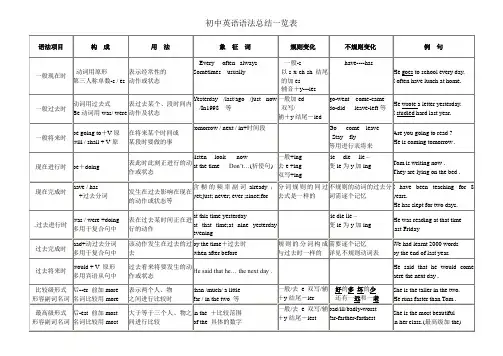
初中英语语法总结一览表
句型转换练习专项指导
①一般现在时:
含有be动词的:He is a student
一般疑问
否定:
特殊疑问句
非单三:we like reading in the moring.
一般疑问
否定:
特殊疑问句
单三:He likes reading in the morning.
一般疑问
否定:
特殊疑问句
②一般过去时:
含有be动词的:he was a student five years ago.
一般疑问
否定:
特殊疑问句
动词过去式的:They went to Ben Jing last week.
一般疑问
否定:
特殊疑问句
③一般将来时:He will go to the Great Wall in two days. 一般疑问
否定:
特殊疑问句
④现在完成时:She has already finished her homework. 一般疑问
否定:
特殊疑问句。

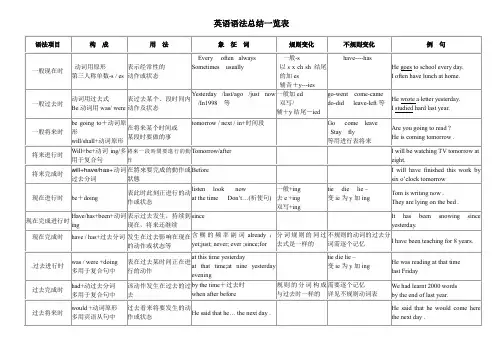
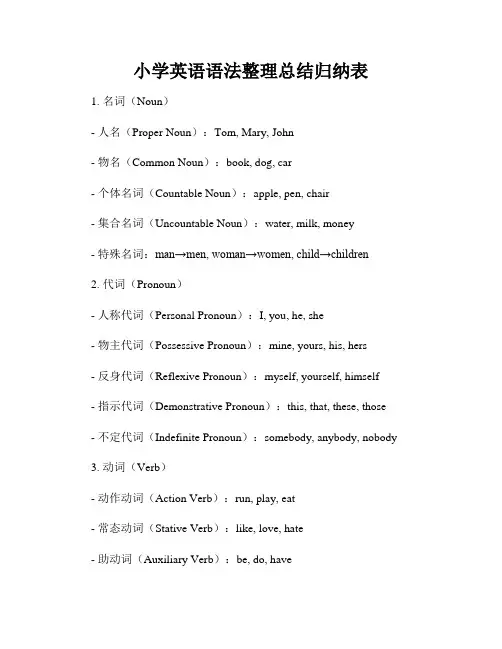
小学英语语法整理总结归纳表1. 名词(Noun)- 人名(Proper Noun):Tom, Mary, John- 物名(Common Noun):book, dog, car- 个体名词(Countable Noun):apple, pen, chair- 集合名词(Uncountable Noun):water, milk, money- 特殊名词:man→men, woman→women, child→children2. 代词(Pronoun)- 人称代词(Personal Pronoun):I, you, he, she- 物主代词(Possessive Pronoun):mine, yours, his, hers- 反身代词(Reflexive Pronoun):myself, yourself, himself- 指示代词(Demonstrative Pronoun):this, that, these, those - 不定代词(Indefinite Pronoun):somebody, anybody, nobody 3. 动词(Verb)- 动作动词(Action Verb):run, play, eat- 常态动词(Stative Verb):like, love, hate- 助动词(Auxiliary Verb):be, do, have- 不规则动词(Irregular Verb):go→went, eat→ate, come→came 4. 形容词(Adjective)- 描绘性形容词(Descriptive Adjective):beautiful, big, happy- 物主形容词(Possessive Adjective):my, your, his, her- 限定性形容词(Limiting Adjective):this, that, these, those5. 副词(Adverb)- 时间副词(Time Adverb):now, then, tomorrow- 地点副词(Place Adverb):here, there, everywhere- 方式副词(Manner Adverb):quickly, slowly, well6. 介词(Preposition)- 时间介词(Time Preposition):in, on, at- 地点介词(Place Preposition):in, on, at- 方式介词(Manner Preposition):with, by, like7. 连词(Conjunction)- 并列连词(Coordinating Conjunction):and, but, or- 从属连词(Subordinating Conjunction):if, because, although 8. 冠词(Article)- 定冠词(Definite Article):the- 不定冠词(Indefinite Article):a, an9. 句子(Sentence)- 简单句(Simple Sentence):I eat an apple.- 复合句(Compound Sentence):She is smart, and she studies hard.- 复合句(Complex Sentence):I will go to the park if it doesn't rain.10. 语态(Voice)- 主动语态(Active Voice):The cat chased the mouse.- 被动语态(Passive Voice):The mouse was chased by the cat.以上是小学英语常见的语法知识总结归纳表,希望对你的学习有所帮助。
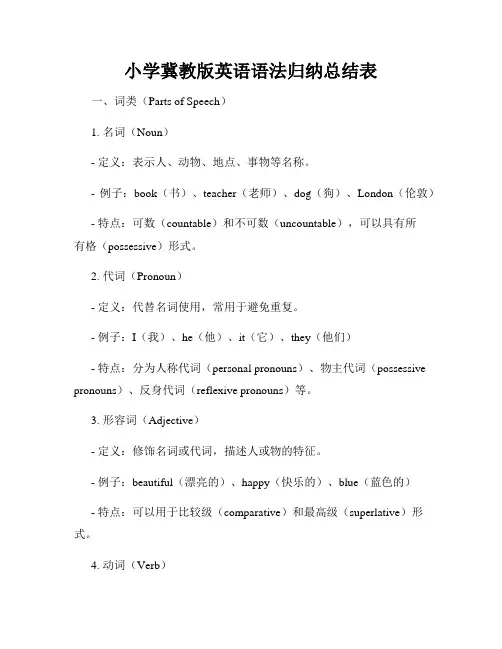
小学冀教版英语语法归纳总结表一、词类(Parts of Speech)1. 名词(Noun)- 定义:表示人、动物、地点、事物等名称。
- 例子:book(书)、teacher(老师)、dog(狗)、London(伦敦)- 特点:可数(countable)和不可数(uncountable),可以具有所有格(possessive)形式。
2. 代词(Pronoun)- 定义:代替名词使用,常用于避免重复。
- 例子:I(我)、he(他)、it(它)、they(他们)- 特点:分为人称代词(personal pronouns)、物主代词(possessive pronouns)、反身代词(reflexive pronouns)等。
3. 形容词(Adjective)- 定义:修饰名词或代词,描述人或物的特征。
- 例子:beautiful(漂亮的)、happy(快乐的)、blue(蓝色的)- 特点:可以用于比较级(comparative)和最高级(superlative)形式。
4. 动词(Verb)- 定义:表示动作、状态或存在。
- 例子:run(跑)、eat(吃)、play(玩)- 特点:根据时态(tense)和语态(voice)的不同形式变化。
5. 副词(Adverb)- 定义:修饰动词、形容词或副词,表示时间、地点、方式等。
- 例子:quickly(快速地)、now(现在)、here(这里)- 特点:可以用于构成比较级和最高级形式。
6. 介词(Preposition)- 定义:连接词与其他词之间的关系。
- 例子:in(在)、on(在……上)、under(在……下)- 特点:常用于表示位置、方向、时间、原因等。
7. 连词(Conjunction)- 定义:连接词组、句子或句子的部分。
- 例子:and(和)、but(但是)、because(因为)- 特点:可以表示并列关系、递进关系、转折关系等。
8. 感叹词(Interjection)- 定义:表示强烈的情感或观点。
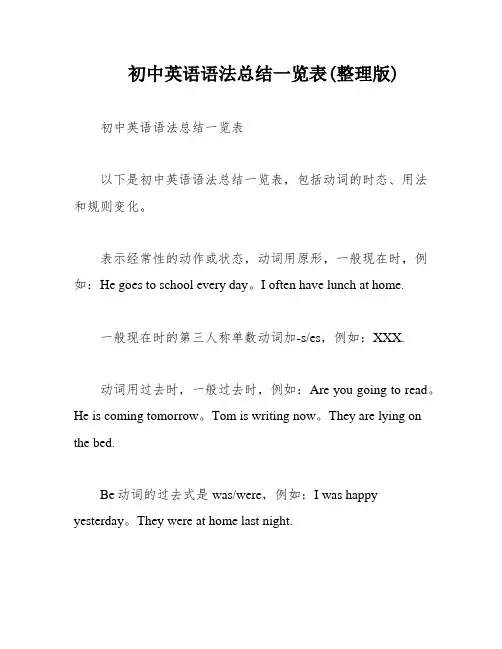
初中英语语法总结一览表(整理版)初中英语语法总结一览表以下是初中英语语法总结一览表,包括动词的时态、用法和规则变化。
表示经常性的动作或状态,动词用原形,一般现在时,例如:He goes to school every day。
I often have lunch at home.一般现在时的第三人称单数动词加-s/es,例如:XXX.动词用过去时,一般过去时,例如:Are you going to read。
He is coming tomorrow。
Tom is writing now。
They are lying on the bed.Be动词的过去式是was/were,例如:I was happy yesterday。
They were at home last night.表示将来要做的事情,用be going to + 动词原形或will/shall + 动词原形,例如:I am going to watch a movie tonight。
She will visit her XXX.表示经常性的动作或状态的时间词,例如:XXX等。
动词规则变化包括-s/es和以辅音字母+y结尾的变为-ies,例如:She studies hard every day。
They fly to New York every summer.表示过去某个时间内的动作或状态,用表过去的时间词,例如:XXX等。
动词规则变化包括以-e结尾的动词加-d,以辅音字母+y结尾的变为-ied,例如:XXX.表示此时此刻正在进行的动作或状态,用现在进行时(be+动词ing),例如:XXX to music now。
They are looking at the pictures.表示将来某个时间或某段时间内要进行的动作或状态,用现在进行时(be+动词ing),例如:I am XXX.表示过去某个时间正在进行的动作,用过去进行时(was/were+动词ing),例如:I was XXX XXX.表示过去某个时间已经完成的动作或状态,用过去完成时(had+动词过去分词),例如:I had XXX by the time she arrived。

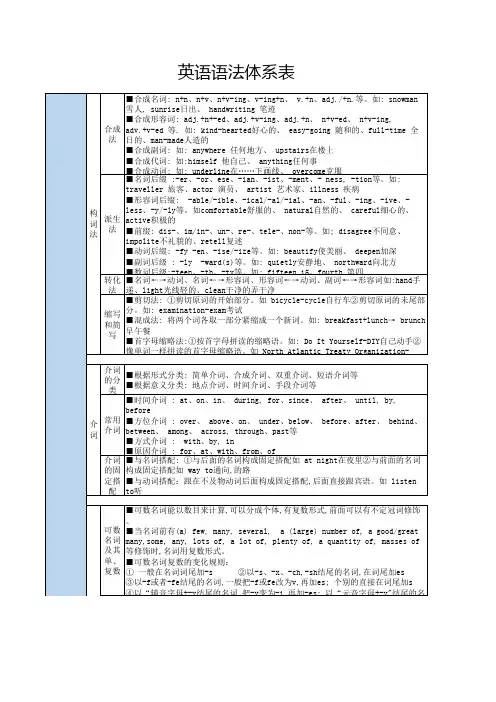
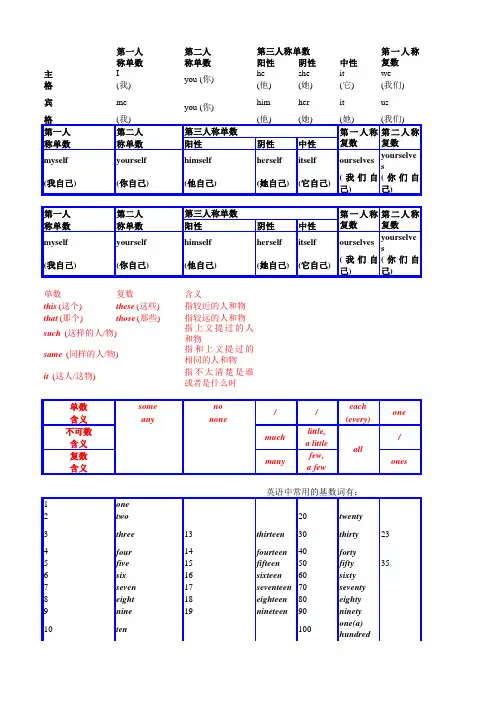
英语语法一览表
名词:
1.可数名词和不可数名词
2.所有格形式:'s 和 of 结构
动词:
1.时态:现在时,过去时,将来时
2.语态:主动语态和被动语态
虚拟语气
形容词和副词:
1.比较级和最高级
2.修饰可数名词和不可数名词的形容词位置
介词:
常用介词及其用法
冠词:
定冠词 "the" 和不定冠词 "a" 或 "an" 的用法
连词:
并列连词(如 and, but, or)和从属连词(如 when, because, if)的用
法
句子结构:
主语、谓语、宾语、定语、状语、补语等句子成分
从句:
1.名词性从句(主语从句、宾语从句、表语从句)2.定语从句(限制性从句和非限制性从句)
3.状语从句(时间状语从句、条件状语从句等)
非谓语动词:
不定式(to do)和动名词(doing)的用法和区别
其他重要语法点:
主谓一致(特别是复数名词和第三人称单数)
倒装句
强调句型等。
英语定语从句语法知识点总结
(名师详细讲解语法+配套实战练习,建议下载保存)
(绝对精品文档,价值很高,值得下载打印收藏)
【区别】限制性定语从句对先行词起修饰作用(相当于形容词的作用,他的作用一是放在先行词与定语从句中间起了连接作用,二是在从句中担当一个成分,并与先行词保持数的一致。
)非限制性定语从句对先行词起补充说明作用,先行词与定语从句往往用逗号隔开,句子相当于并列句,状语从句。
一、关系代词分类
一、关系代词用法
【注】当关系代词as或which引导非限制性定语从句,修饰主句内容时,若as或which作主语,则从句的谓语动词用单数形式。
例:。
时态肯定一般现在时He eats apples.一般过去时He ate apples.现在进行时He is eating apples.过去进行时He was eating apples.现在完成时He has eaten apples.过去完成时He had eaten apples.现在完成进行时He has been eating apples.过去完成进行时He had been eating apples.一般将来时He will eat apples.过去将来时He would eat apples.将来进行时He will be eating apples.过去将来进行时He would be eating apples.将来完成时He will have eaten apples.过去将来完成时He would have eaten apples.将来完成进行时He will have been eating apples.过去将来完成进行时否定疑问He doesn't eatapples.Does he eat apples? He didn't eatapples.Did he eat apples? He isn't eatingapples.Is he eating apples?He wasn't eating apples.Was he eating apples?He hasn't eatenapples.Has he eaten apples? He hadn't eatenapples.Had he eaten apples?He hasn't been eating apples.Has he been eating apples?He hadn't been eating apples.Had he been eating apples?He won't eat apples.Will he eat apples? He wouldn't eatapples.Would he eat apples?He won't be eating apples.Will he be eating apples?He wouldn't be eating apples.Would he be eating apples?He won't have eaten apples.Will he have eaten apples?He wouldn't have eaten apples.Would he have eaten apples?He won't have been eating apples.Will he have been eating apples?被动Apples are eaten by him.Apples were eaten by him.Apples are being eaten by him.Apples were being eaten by him.Apples have been eaten by him.Apples had been eaten by him.Apples have been being eaten by him.Apples had been being eaten by him.Apples will be eaten by him.Apples would be eaten by him.Apples will be being eaten by him.Apples would be being eaten by him.Apples will have been eaten by him.Apples would have been eaten by him.Apples will have been being eaten by him.。
I 根据句意填词。
1. I need more money, because the ticket c 50 yuan. 2. You should write a thank-you n to him.3. Please be quiet. The baby is s .4. How do you i your English?5. ---- Tom isn’t having a good time.---- N am I.6. The lady (收到) a letter from her son yesterday.7. What a (幸运的) boy he is!8. Have you ever _______(去) to the Water World?9. How long have you been_________(学习) English? 10 .Have you ever __________(听说过) of a Disney Cruise?11. Uncle Hu e________ staying with the children. 12. I don’t want to watch TV this evening. I’ll listen to music i________ .13. The children worked from eight to half past eleven, so they felt t________. 14. You mustn’t c________ the road from here. It’s dangerous.15. Children will n________ forget Uncle John. 16.The old man is _____ ______(恼火)his son.17.I did ______ ________ (学得更好)math than English. 18.When the UFO ______ _______ (起飞) , the man was riding the bike.ngzhong is a beautiful place, I fall in _______ _______ ( 爱上)it. 20.I think I have ______ ______ (学得有趣)Chinese.II.用所给动词的正确形式填空。
英语作文常用谚语、俗语1、A liar is not believed when he speaks the truth. 说谎者即使讲真话也没人相信。
2、A little knowledge is a dangerous thing. 一知半解,自欺欺人。
3、All rivers run into sea. 海纳百川。
4、All roads lead to Rome. 条条大路通罗马。
5、All work and no play makes Jack a dull boy. 只会用功不玩耍,聪明孩子也变傻。
6、A bad beginning makes a bad ending. 不善始者不善终。
7、Actions speak louder than words. 事实胜于雄辩。
8、A faithful friend is hard to find. 知音难觅。
9、A friend in need is a friend indeed. 患难见真情。
10、A friend is easier lost than found. 得朋友难,失朋友易。
11、A good beginning is half done. 良好的开端是成功的一半。
12、A good beginning makes a good ending. 善始者善终。
13、A good book is a good friend. 好书如挚友。
14、A good medicine tastes bitter. 良药苦口。
15、A mother's love never changes. 母爱永恒。
16、An apple a day keeps the doctor away. 一天一苹果,不用请医生。
17、A single flower does not make a spring. 一花独放不是春,百花齐放春满园。
18、A year's plan starts with spring. 一年之计在于春。